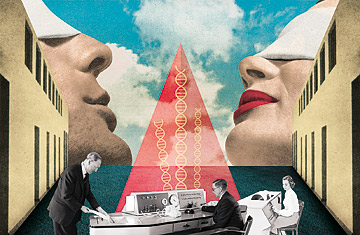
Remember the famous sweaty-T-shirt experiment? When asked to sniff men's shirts back in 1995, women who were not on the Pill preferred the scent of men who had certain genes that were more dissimilar to their own. Opposites, the data suggested, really do attract. The experiment inspired the launch last summer of GenePartner.com a Swiss company that uses genetics to predict whether two people will have butterflies-in-the-stomach chemistry. Already, partnerships are in the works with both traditional matchmakers and new online-dating sites, including Sense2Love.com which plans to add genetic matching by the end of the summer.
GenePartner is testing only one group of genes: human leukocyte antigens (HLAs), which play an essential role in immune function. One hypothesis from the T-shirt experiment is that the offspring of couples with different HLAs stand to inherit a greater variety of potential immune responses and will therefore be more resistant to disease. Another is that HLAs help people screen out mating partners to whom they might be too closely related.
GenePartner tested long-term couples' HLA makeup and had them fill out in-depth questionnaires. "We asked them whether they find their relationship passionate, about the quality of intercourse, if it was love at first sight," says co-founder Tamara Brown. With genetic data from 270 couples, the company came up with an algorithm for predicting compatibility based on HLA combinations. "It's something you don't think about when you're choosing a partner," the neurobiologist says. "But it's an important evolutionary principle, to keep the species alive."
GenePartner is offering genetic matching to companies already looking to hook up people on the basis of important social factors like age, interests and geographic location. "We're very accurate with the biological part--predicting that 'spark,'" Brown says.
Not everyone is convinced by the science behind the concept. "There's conflicting evidence as to the extent to which HLA plays a role in what we call mate choice," says Peter Donnelly, director of Oxford's Wellcome Centre for Human Genetics. But GenePartner is betting that the lovelorn will give it a shot. For now, for $99, you can order a kit, swab your cheek, mail it to Switzerland and get your GenePartner ID. You can then be matched with anybody in the GenePartner database. Eventually, you'll be able to take your ID with you from dating site to dating site. Or post it on, say, Facebook. "You could see who in your network you're genetically compatible with," says Brown. And with any luck, spare yourself a lot of shirt-sniffing.
